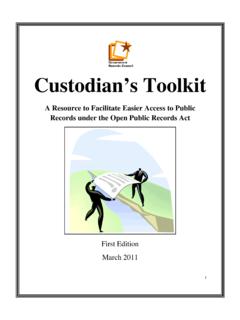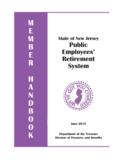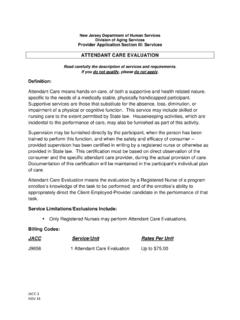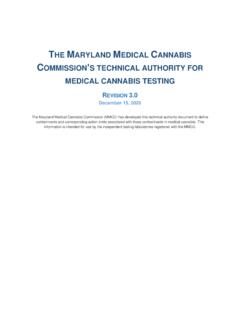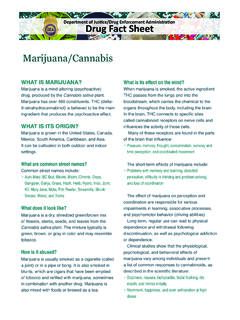Transcription of SPECIAL ADOPTION TREASURY-GENERAL NEW JERSEY …
1 53 NJR 9(2) September 20, 2021 SPECIAL ADOPTION TREASURY-GENERAL NEW JERSEY cannabis REGULATORY COMMISSION Personal Use cannabis Rules SPECIAL Adopted New Rules: 17:30 Adopted: August 19, 2021, by New JERSEY cannabis Regulatory Commission, Dianna Houenou, Chair. Filed: August 19, 2021, as Authority: 24:6I-31 et seq. Effective Date: August 19, 2021. Expiration Date: August 19, 2022. This rule may be viewed or downloaded from the New JERSEY Regulatory Commission s (Commission) website at Take notice that the new rules are adopted pursuant to 24 (1)(a) of the New JERSEY cannabis Regulatory, Enforcement Assistance, and Marketplace Modernization Act, 24:6I-31 et seq.
2 ( 2021, c. 16), and became effective upon acceptance for filing by the Office of Administrative Law. The specially adopted new rules shall be effective for a period not to exceed one year from the date of filing of the new rules, that is, until August 19, 2022. The Commission has provided this SPECIAL ADOPTION to the Attorney General, State Treasurer, and the Commissioner of the Departments of Health and Banking and Insurance for a consultation period, after which the Commission anticipates filing a notice of proposal to readopt the chapter with amendments reflecting the results of that consultation.
3 In accordance with 24:6I- 2 (1)(b) the rules, as readopted, will become effective upon acceptance for filing by the Office of Administrative Law if filed on or before the expiration date of the rules. The adopted amendments will be effective upon publication in the New JERSEY Register. Federal Standards Analysis The New JERSEY cannabis Regulatory, Enforcement Assistance, and Marketplace Modernization Act (Act) obliges the New JERSEY cannabis Regulatory Commission to promulgate rules necessary or proper to enable it to carry out the Commission s duties, functions, and powers with respect to overseeing the development, regulation, and enforcement of activities associated with the personal use of cannabis pursuant to 2021, These duties include the regulation of the purchase, sale, cultivation, production, manufacturing, transportation, and delivery of cannabis or cannabis items in accordance with the provisions of the Act.
4 Therefore, the Act requires the Commission to promulgate rules governing the regulated community s cultivation, possession, manufacture, sale, distribution, and use of cannabis . The Controlled Substances Act, 21 801 et seq., prohibits the cultivation, distribution, and possession of marijuana, for any reason, regardless of state law. 21 841 et seq. The new rules anticipate that members of the regulated community would cultivate, distribute, and possess marijuana, and may engage in certain financial activities that are ancillary to cultivation, distribution, and possession of marijuana. These ancillary financial activities may constitute prohibited conduct under other Federal criminal and civil laws, such as the money laundering statutes, the 3 unlicensed money transmitter statute, and the Bank Secrecy Act (BSA).
5 18 1956 through 1957, and 1960; and 31 5318. Therefore, the new rules will conflict with Federal law. Members of the regulated community who engage in activities contemplated by the Act might incur Federal civil and criminal liability. 24 notes that States are not required to enforce [Federal] law or prosecute people for engaging in activities prohibited by [Federal] law; therefore, compliance with [the Act] does not put the State of New JERSEY in violation of [Federal] law, and 24:6I-54 further directs law enforcement in New JERSEY to not cooperate with Federal agencies enforcing The Controlled Substances Act for activities solely authorized by the Act.
6 Between October 2009 and late October 2014, the United States Department of Justice (Justice Department) issued a series of formal memoranda to United States Attorneys to guide their exercise of investigative and prosecutorial discretion in states enacting laws authorizing the cultivation, distribution, and possession of marijuana, for medicinal and/or recreational purposes. David W. Ogden, Deputy Attorney Gen., Memorandum for Selected United States Attorneys: Investigations and Prosecutions in States Authorizing the Medical Use of Marijuana (October 19, 2009); James M. Cole, Deputy Attorney Gen., Memorandum for United States Attorneys: Guidance Regarding the Ogden Memo in Jurisdictions Seeking to Authorize Marijuana for Medical Use (June 29, 2011); James M.
7 Cole, Deputy Attorney Gen., Memorandum for All United States Attorneys: Guidance Regarding Marijuana Enforcement (August 29, 2013); James M. Cole, Deputy Attorney Gen., Memorandum for All United States Attorneys: Guidance Regarding 32 Marijuana Related Financial Crimes (February 14, 2014); and Monty 4 Wilkinson, Director of the Executive Office for United States Attorney s, Policy Statement Regarding Marijuana Issues in Indian Country (Oct. 28, 2014). While noting the Justice Department s commitment to enforcing the Controlled Substances Act, these guidance memoranda instructed United States Attorneys to focus on the following eight enforcement interests in prioritizing the prosecution of Federal laws criminalizing marijuana-related activity in states that have enacted laws authorizing marijuana-related conduct: 1.
8 Preventing the distribution of marijuana to minors; 2. Preventing revenue from the sale of marijuana from going to criminal enterprises, gangs, and cartels; 3. Preventing the diversion of marijuana from states where it is legal in some form under state law to other states; 4. Preventing state-authorized marijuana activity from being used as a cover or pretext for the trafficking of other illegal drugs or other illegal activity; 5. Preventing violence and the use of firearms in the cultivation and distribution of marijuana; 6. Preventing drugged driving and the exacerbation of other adverse public health consequences associated with marijuana use; 7.
9 Preventing the growing of marijuana on public lands and the attendant public safety and environmental dangers posed by marijuana production on public lands; and 8. Preventing marijuana possession or use on federal property. Cole (August 29, 2013), Id., at 1-2. 5 The memoranda encouraged United States Attorneys to continue to rely on states that have enacted laws authorizing marijuana-related conduct to address marijuana-related activity through enforcement of state narcotics laws, if those states provide the necessary resources and demonstrate the willingness to enforce their laws and regulations in a manner that ensures they do not undermine the eight Federal enforcement priorities, Id.
10 , at 2-3, and implement clear, strong and effective regulatory and enforcement systems in order to minimize the threat posed to the eight Federal enforcement priorities. Cole (February 14, 2014), Id., at 3. The memoranda noted that persons and entities engaged in marijuana-related activities are more likely to risk entanglement with conduct that implicates the eight [Federal] enforcement priorities in states that lack clear and robust regulatory schemes and enforcement systems. Ibid. In guidance issued concurrently with Deputy United States Attorney General Cole s February 14, 2014, memorandum on marijuana-related financial crime enforcement priorities, Ibid.
